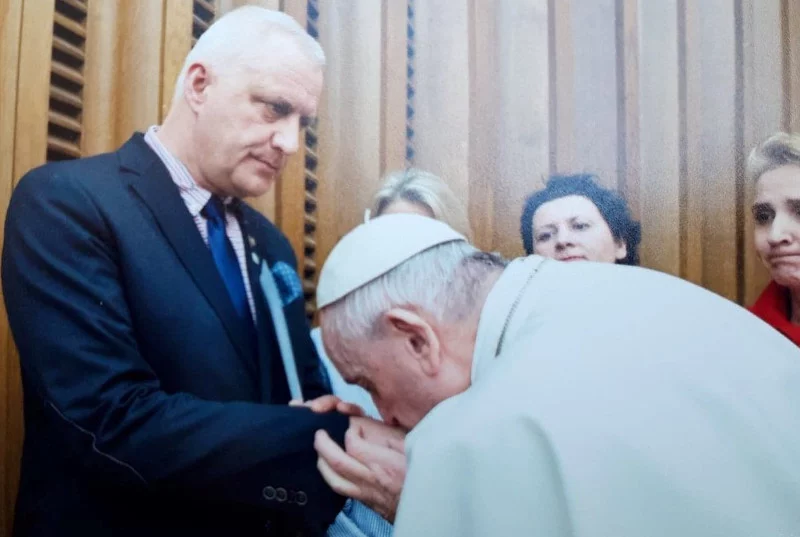The founder of an organisation that helped victims of sex abuse by Catholic clergy has been found by a court to have given unreliable accounts of his own alleged abuse at the hands of a priest.
Marek Lisiński became a well-known figure, speaking on behalf of the growing number of victims who have come forward in recent years to make claims of historical abuse at the hands of clergy. He himself also claimed to have been abused by his parish priest as a 13-year-old altar boy.
In 2019, when a Polish delegation led by an opposition MP presented the pope with a report on abuse in the Polish church, Francis bent down to kiss Lisiński’s hand after hearing that he was a victim.
papież Franciszek @Pontifex_pl pocałował w rękę prezesa fundacji "Nie lękajcie się"
fundacja reprezentuje ofiary księży pedofili
z papieżem rozmawiały @JoankaSW @agatadiduszko i #MarekLisiński pic.twitter.com/nw9WrsstvX
— OKO.press (@oko_press) February 20, 2019
Five years earlier, an ecclesiastical court in Poland had found a priest – named only as Zdzisław W. under Polish privacy law – guilty of abusing Lipiński as a child. However, the local Catholic curia rejected Lipiński’s resultant claim for compensation, reports news website Onet.
He then launched a lawsuit and, in 2019, a civil court confirmed that Zdzisław W. was responsible for the abuse. However, it rejected Lisiński’s claim for one million zloty (€216,000) in compensation. Both Lipiński and the priest appealed against that ruling.
Soon after, Gazeta Wyborcza, a leading daily, published an investigation that cast doubt on Lisiński’s claims of abuse at the hands of Zdzisław W.
The newspaper revealed that, at one meeting with the curia, Lisiński informed them that he “intends to publicise the matter, a book on the subject is almost ready…but everything can still be withdrawn as long as the parties agree”. He suggested they could “make a deal” for 235,000 zloty.
The newspaper also learned that, before Lisiński accused Zdzisław W. of abuse, he had borrowed money from him three times and not paid it back. He told the priest that the money was for his wife’s cancer treatment, but she did not actually have cancer.
In a separate case, Lisiński was last year convicted of extorting 30,000 zloty from one of the victims he had helped, who received one million zloty in compensation from the church for her abuse. Lisiński had falsely told her that he needed money for his own alleged cancer treatment.
Now an appeals court has also overturned the 2019 ruling against Zdzisław W. In a justification for the judgement released this week, it found “such far-reaching discrepancies” in Lisiński’s various accounts of the same alleged events that “the claimant’s claims are unreliable”.
During the court proceedings, Zdzisław W. was also able to produce a number of witnesses who denied that Lisiński had ever been an altar boy, reports Gazeta Wyborcza.
Lisiński also sought to claim that signatures on documents showing receipt of money he had borrowed from the priest were not his. But this was rejected by a court-appointed expert, who identified them as Lisiński’s hand.
In 2019, Lisiński resigned as the head of his foundation supporting victims of clerical sex abuse, which was itself then dissolved. He told Onet in March 2020 that he was still supporting victims, “although now as a private person”.
The Catholic church in Poland has in recent years been hit by a wave of claims of abuse by priests, and of attempts by the church hierarchy to cover them up. The Vatican has disciplined a number of senior Polish bishops for their “negligence” in dealing with the issue.
Correction: an earlier version of this article stated that Lisiński was found to have lied about his abuse. While he has been found to have lied on other issues, the court only found his claims regarding abuse to be unreliable. The article has been updated to acknowledge this.
Main image credit: Agata Diduszko/Twitter

Daniel Tilles is editor-in-chief of Notes from Poland. He has written on Polish affairs for a wide range of publications, including Foreign Policy, POLITICO Europe, EUobserver and Dziennik Gazeta Prawna.




















